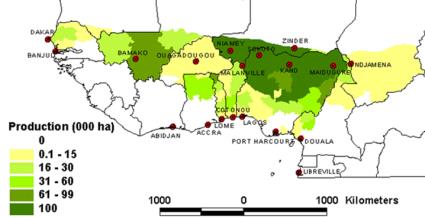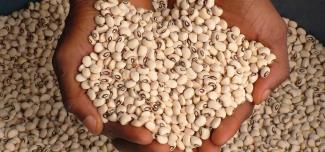Africa has been reluctant to embrace GM technology in part due to misleading and deceptive statements and influence by organizations, such as Greenpeace and others, opposed to the introduction of GM cultivars. Africa is especially susceptible to drought, insect predation, and other problems which could be partly resolved by using GM varieties of food crops.
Cotton expressing Bt, a natural insecticide, has been  adopted in the U.S., India, and Egypt. The cowpea (‘Black-eyed Susan’ in the U.S.) strain Sampea 20-T is the first food crop to be approved in Africa. The cowpea a an important source of protein and energy for over 200 million people in West Africa. Unfortunately, importation is required because up to 90 percent of the domestic crop can be destroyed by a pest, the the cowpea pod borer.
adopted in the U.S., India, and Egypt. The cowpea (‘Black-eyed Susan’ in the U.S.) strain Sampea 20-T is the first food crop to be approved in Africa. The cowpea a an important source of protein and energy for over 200 million people in West Africa. Unfortunately, importation is required because up to 90 percent of the domestic crop can be destroyed by a pest, the the cowpea pod borer.
Sampea 20-T was developed by the African Agricultural Foundation using technology provided by CSIRO of Australia. Other participants in the project included USAID, the Rockefeller Institute, and the Danforth Plant Science Center. Bayer will distribute the cultivar to family farms as a humanitarian gesture.
It is hoped that the success of Sampea 20-T will convince leaders in othe r African nations that GM crops resistant to pests benefit both farmers and consumers. It is noted that a combination of stubborness and ignorance prevented donations of U.S. corn to drought-stricken nations in Sub-Saharan Africa. Aid shipments were refused based on the unsubstantiated fear of GM ingredients. Citizens in Malawi and Zambia starved as a result of the mischievous intervention of activists in Western Europe who disseminate falsehoods regarding GM crops while secure in their own availability of food.
r African nations that GM crops resistant to pests benefit both farmers and consumers. It is noted that a combination of stubborness and ignorance prevented donations of U.S. corn to drought-stricken nations in Sub-Saharan Africa. Aid shipments were refused based on the unsubstantiated fear of GM ingredients. Citizens in Malawi and Zambia starved as a result of the mischievous intervention of activists in Western Europe who disseminate falsehoods regarding GM crops while secure in their own availability of food.